The Rise of China and Its Impact on International Politics Analysis
VerifiedAdded on 2022/10/19
|8
|2315
|54
Essay
AI Summary
This essay provides a critical analysis of China's rise and its impact on international politics, focusing on the Asia-Pacific region. The author explores the topic through the lenses of liberalism and realism, examining how China's economic growth, military expansion, and disregard for certain liberal principles have reshaped the global power balance. The essay analyzes two articles to support the arguments, demonstrating the contrasting perspectives of the two political theories on China's actions and their implications for regional and international stability. The essay concludes that China's rise has significantly altered the international landscape, prompting shifts in strategies among nations, and ultimately finds support from the realism political theory. The essay highlights the implications of China's rise and influence on international politics.
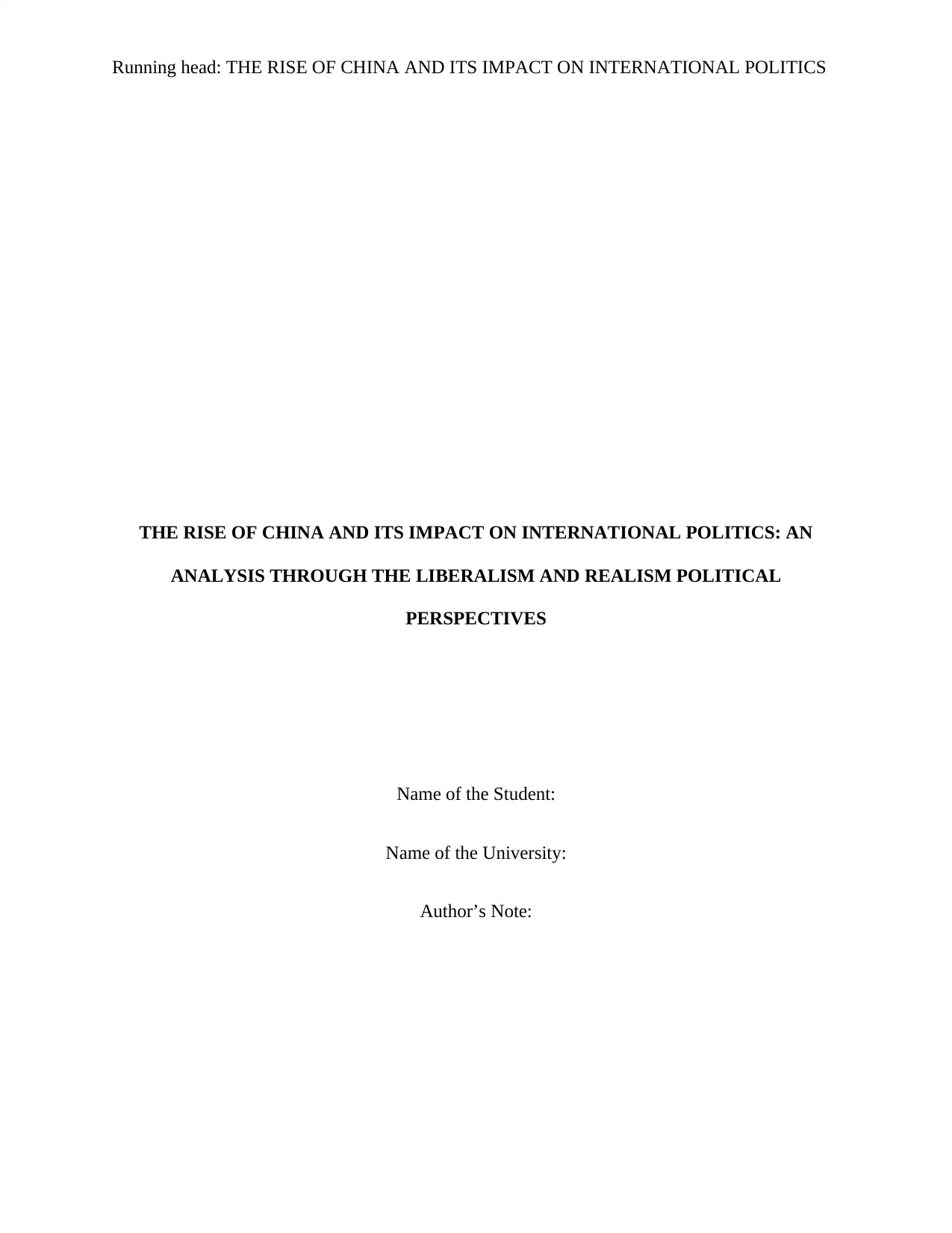
Running head: THE RISE OF CHINA AND ITS IMPACT ON INTERNATIONAL POLITICS
THE RISE OF CHINA AND ITS IMPACT ON INTERNATIONAL POLITICS: AN
ANALYSIS THROUGH THE LIBERALISM AND REALISM POLITICAL
PERSPECTIVES
Name of the Student:
Name of the University:
Author’s Note:
THE RISE OF CHINA AND ITS IMPACT ON INTERNATIONAL POLITICS: AN
ANALYSIS THROUGH THE LIBERALISM AND REALISM POLITICAL
PERSPECTIVES
Name of the Student:
Name of the University:
Author’s Note:
Paraphrase This Document
Need a fresh take? Get an instant paraphrase of this document with our AI Paraphraser
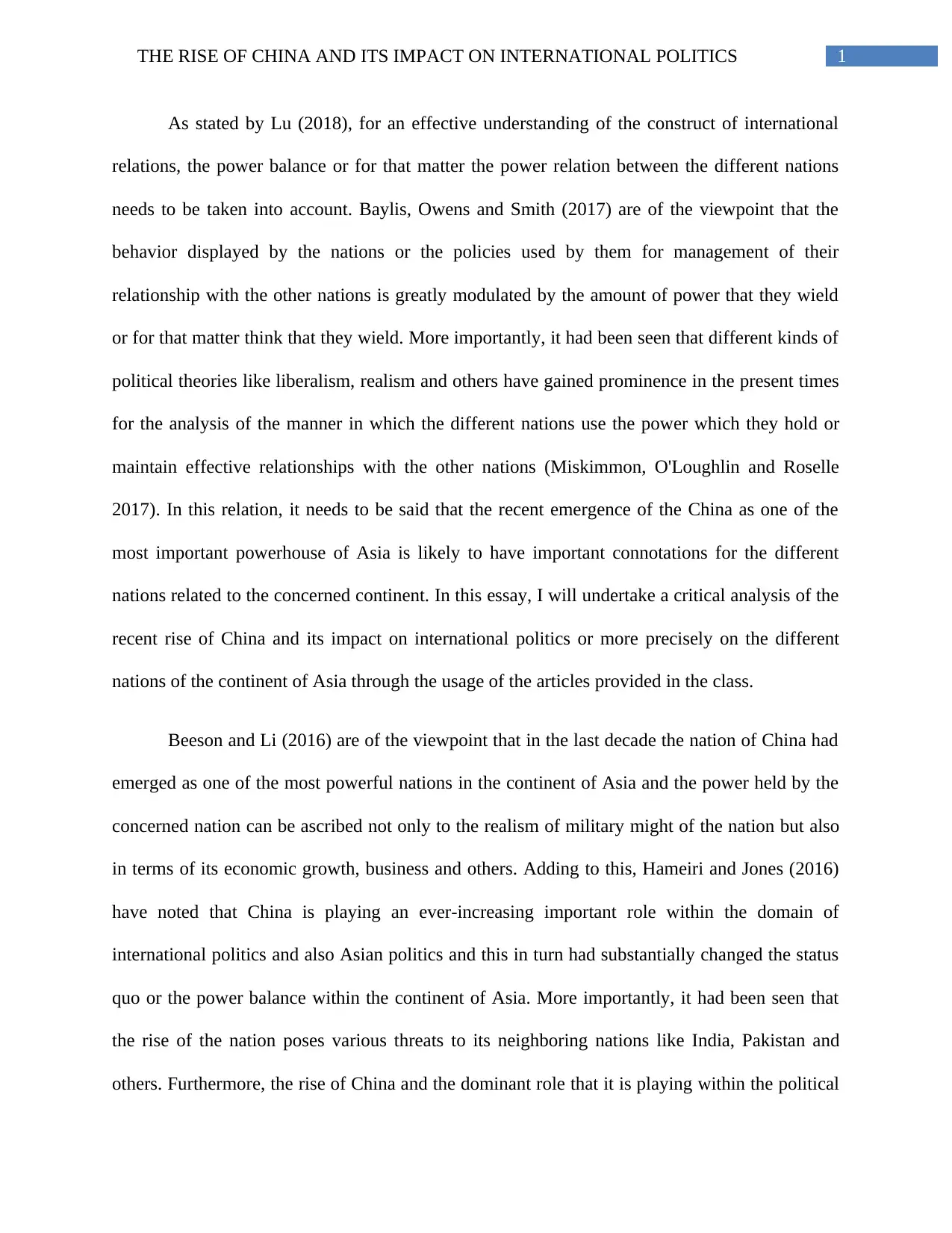
1THE RISE OF CHINA AND ITS IMPACT ON INTERNATIONAL POLITICS
As stated by Lu (2018), for an effective understanding of the construct of international
relations, the power balance or for that matter the power relation between the different nations
needs to be taken into account. Baylis, Owens and Smith (2017) are of the viewpoint that the
behavior displayed by the nations or the policies used by them for management of their
relationship with the other nations is greatly modulated by the amount of power that they wield
or for that matter think that they wield. More importantly, it had been seen that different kinds of
political theories like liberalism, realism and others have gained prominence in the present times
for the analysis of the manner in which the different nations use the power which they hold or
maintain effective relationships with the other nations (Miskimmon, O'Loughlin and Roselle
2017). In this relation, it needs to be said that the recent emergence of the China as one of the
most important powerhouse of Asia is likely to have important connotations for the different
nations related to the concerned continent. In this essay, I will undertake a critical analysis of the
recent rise of China and its impact on international politics or more precisely on the different
nations of the continent of Asia through the usage of the articles provided in the class.
Beeson and Li (2016) are of the viewpoint that in the last decade the nation of China had
emerged as one of the most powerful nations in the continent of Asia and the power held by the
concerned nation can be ascribed not only to the realism of military might of the nation but also
in terms of its economic growth, business and others. Adding to this, Hameiri and Jones (2016)
have noted that China is playing an ever-increasing important role within the domain of
international politics and also Asian politics and this in turn had substantially changed the status
quo or the power balance within the continent of Asia. More importantly, it had been seen that
the rise of the nation poses various threats to its neighboring nations like India, Pakistan and
others. Furthermore, the rise of China and the dominant role that it is playing within the political
As stated by Lu (2018), for an effective understanding of the construct of international
relations, the power balance or for that matter the power relation between the different nations
needs to be taken into account. Baylis, Owens and Smith (2017) are of the viewpoint that the
behavior displayed by the nations or the policies used by them for management of their
relationship with the other nations is greatly modulated by the amount of power that they wield
or for that matter think that they wield. More importantly, it had been seen that different kinds of
political theories like liberalism, realism and others have gained prominence in the present times
for the analysis of the manner in which the different nations use the power which they hold or
maintain effective relationships with the other nations (Miskimmon, O'Loughlin and Roselle
2017). In this relation, it needs to be said that the recent emergence of the China as one of the
most important powerhouse of Asia is likely to have important connotations for the different
nations related to the concerned continent. In this essay, I will undertake a critical analysis of the
recent rise of China and its impact on international politics or more precisely on the different
nations of the continent of Asia through the usage of the articles provided in the class.
Beeson and Li (2016) are of the viewpoint that in the last decade the nation of China had
emerged as one of the most powerful nations in the continent of Asia and the power held by the
concerned nation can be ascribed not only to the realism of military might of the nation but also
in terms of its economic growth, business and others. Adding to this, Hameiri and Jones (2016)
have noted that China is playing an ever-increasing important role within the domain of
international politics and also Asian politics and this in turn had substantially changed the status
quo or the power balance within the continent of Asia. More importantly, it had been seen that
the rise of the nation poses various threats to its neighboring nations like India, Pakistan and
others. Furthermore, the rise of China and the dominant role that it is playing within the political
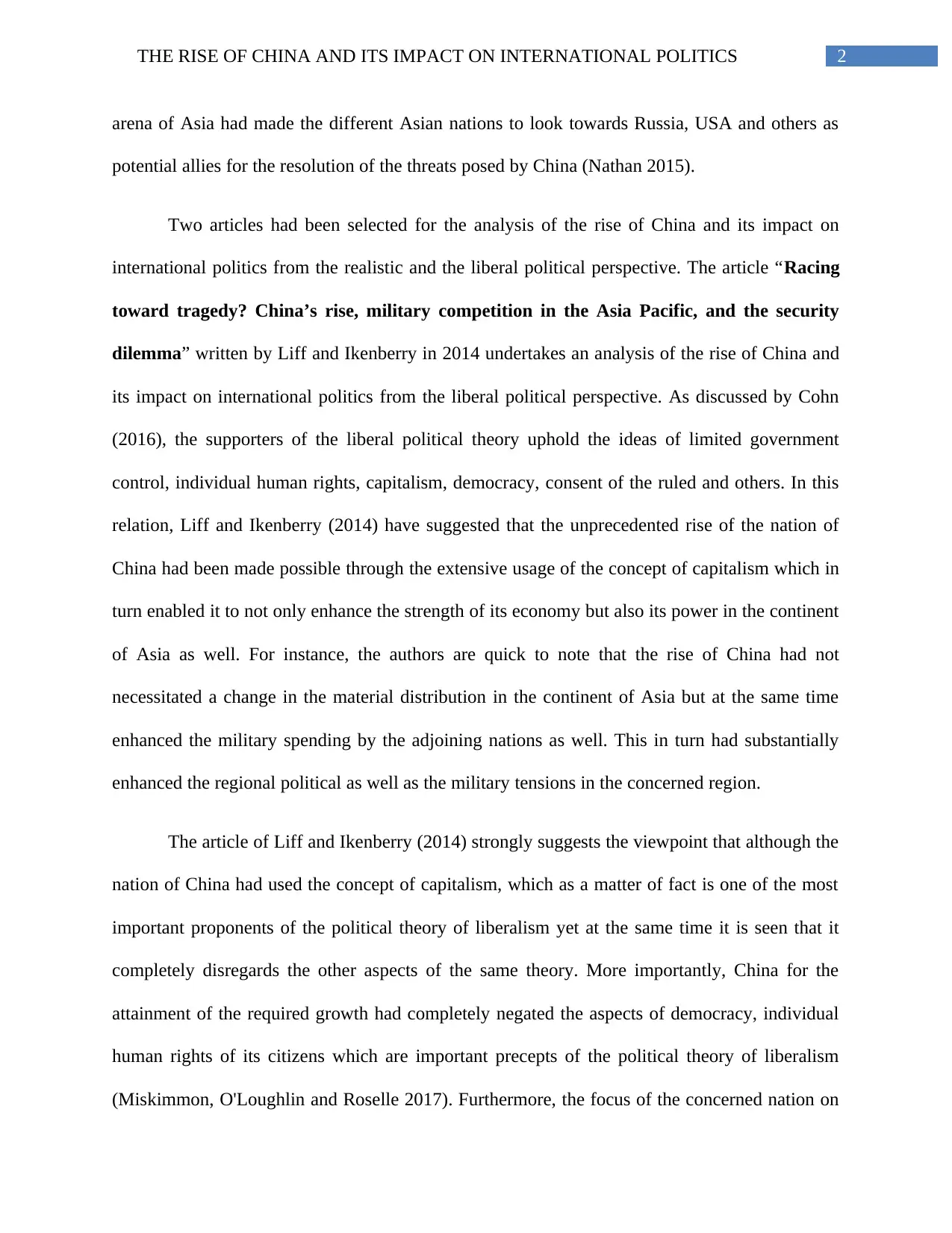
2THE RISE OF CHINA AND ITS IMPACT ON INTERNATIONAL POLITICS
arena of Asia had made the different Asian nations to look towards Russia, USA and others as
potential allies for the resolution of the threats posed by China (Nathan 2015).
Two articles had been selected for the analysis of the rise of China and its impact on
international politics from the realistic and the liberal political perspective. The article “Racing
toward tragedy? China’s rise, military competition in the Asia Pacific, and the security
dilemma” written by Liff and Ikenberry in 2014 undertakes an analysis of the rise of China and
its impact on international politics from the liberal political perspective. As discussed by Cohn
(2016), the supporters of the liberal political theory uphold the ideas of limited government
control, individual human rights, capitalism, democracy, consent of the ruled and others. In this
relation, Liff and Ikenberry (2014) have suggested that the unprecedented rise of the nation of
China had been made possible through the extensive usage of the concept of capitalism which in
turn enabled it to not only enhance the strength of its economy but also its power in the continent
of Asia as well. For instance, the authors are quick to note that the rise of China had not
necessitated a change in the material distribution in the continent of Asia but at the same time
enhanced the military spending by the adjoining nations as well. This in turn had substantially
enhanced the regional political as well as the military tensions in the concerned region.
The article of Liff and Ikenberry (2014) strongly suggests the viewpoint that although the
nation of China had used the concept of capitalism, which as a matter of fact is one of the most
important proponents of the political theory of liberalism yet at the same time it is seen that it
completely disregards the other aspects of the same theory. More importantly, China for the
attainment of the required growth had completely negated the aspects of democracy, individual
human rights of its citizens which are important precepts of the political theory of liberalism
(Miskimmon, O'Loughlin and Roselle 2017). Furthermore, the focus of the concerned nation on
arena of Asia had made the different Asian nations to look towards Russia, USA and others as
potential allies for the resolution of the threats posed by China (Nathan 2015).
Two articles had been selected for the analysis of the rise of China and its impact on
international politics from the realistic and the liberal political perspective. The article “Racing
toward tragedy? China’s rise, military competition in the Asia Pacific, and the security
dilemma” written by Liff and Ikenberry in 2014 undertakes an analysis of the rise of China and
its impact on international politics from the liberal political perspective. As discussed by Cohn
(2016), the supporters of the liberal political theory uphold the ideas of limited government
control, individual human rights, capitalism, democracy, consent of the ruled and others. In this
relation, Liff and Ikenberry (2014) have suggested that the unprecedented rise of the nation of
China had been made possible through the extensive usage of the concept of capitalism which in
turn enabled it to not only enhance the strength of its economy but also its power in the continent
of Asia as well. For instance, the authors are quick to note that the rise of China had not
necessitated a change in the material distribution in the continent of Asia but at the same time
enhanced the military spending by the adjoining nations as well. This in turn had substantially
enhanced the regional political as well as the military tensions in the concerned region.
The article of Liff and Ikenberry (2014) strongly suggests the viewpoint that although the
nation of China had used the concept of capitalism, which as a matter of fact is one of the most
important proponents of the political theory of liberalism yet at the same time it is seen that it
completely disregards the other aspects of the same theory. More importantly, China for the
attainment of the required growth had completely negated the aspects of democracy, individual
human rights of its citizens which are important precepts of the political theory of liberalism
(Miskimmon, O'Loughlin and Roselle 2017). Furthermore, the focus of the concerned nation on
⊘ This is a preview!⊘
Do you want full access?
Subscribe today to unlock all pages.

Trusted by 1+ million students worldwide
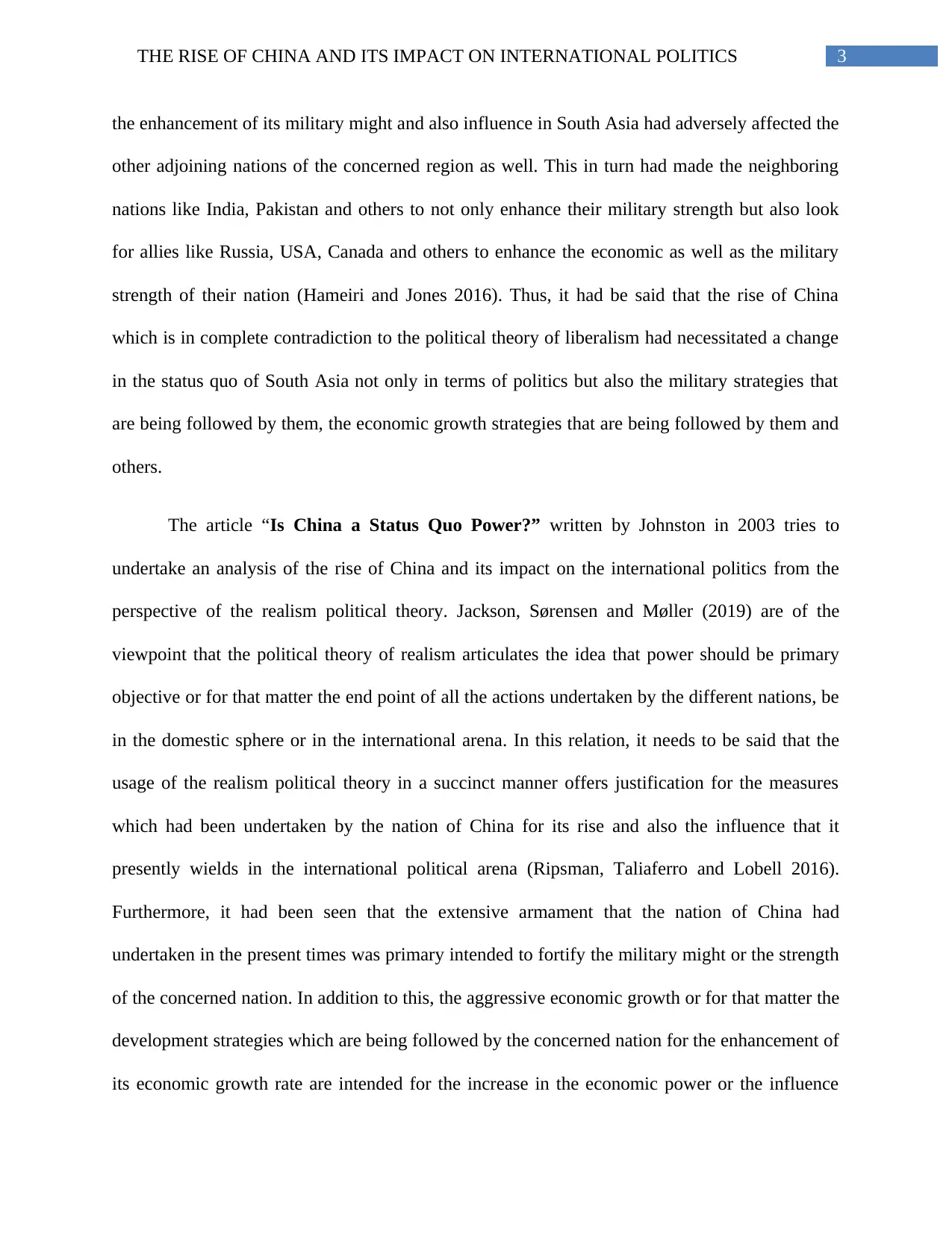
3THE RISE OF CHINA AND ITS IMPACT ON INTERNATIONAL POLITICS
the enhancement of its military might and also influence in South Asia had adversely affected the
other adjoining nations of the concerned region as well. This in turn had made the neighboring
nations like India, Pakistan and others to not only enhance their military strength but also look
for allies like Russia, USA, Canada and others to enhance the economic as well as the military
strength of their nation (Hameiri and Jones 2016). Thus, it had be said that the rise of China
which is in complete contradiction to the political theory of liberalism had necessitated a change
in the status quo of South Asia not only in terms of politics but also the military strategies that
are being followed by them, the economic growth strategies that are being followed by them and
others.
The article “Is China a Status Quo Power?” written by Johnston in 2003 tries to
undertake an analysis of the rise of China and its impact on the international politics from the
perspective of the realism political theory. Jackson, Sørensen and Møller (2019) are of the
viewpoint that the political theory of realism articulates the idea that power should be primary
objective or for that matter the end point of all the actions undertaken by the different nations, be
in the domestic sphere or in the international arena. In this relation, it needs to be said that the
usage of the realism political theory in a succinct manner offers justification for the measures
which had been undertaken by the nation of China for its rise and also the influence that it
presently wields in the international political arena (Ripsman, Taliaferro and Lobell 2016).
Furthermore, it had been seen that the extensive armament that the nation of China had
undertaken in the present times was primary intended to fortify the military might or the strength
of the concerned nation. In addition to this, the aggressive economic growth or for that matter the
development strategies which are being followed by the concerned nation for the enhancement of
its economic growth rate are intended for the increase in the economic power or the influence
the enhancement of its military might and also influence in South Asia had adversely affected the
other adjoining nations of the concerned region as well. This in turn had made the neighboring
nations like India, Pakistan and others to not only enhance their military strength but also look
for allies like Russia, USA, Canada and others to enhance the economic as well as the military
strength of their nation (Hameiri and Jones 2016). Thus, it had be said that the rise of China
which is in complete contradiction to the political theory of liberalism had necessitated a change
in the status quo of South Asia not only in terms of politics but also the military strategies that
are being followed by them, the economic growth strategies that are being followed by them and
others.
The article “Is China a Status Quo Power?” written by Johnston in 2003 tries to
undertake an analysis of the rise of China and its impact on the international politics from the
perspective of the realism political theory. Jackson, Sørensen and Møller (2019) are of the
viewpoint that the political theory of realism articulates the idea that power should be primary
objective or for that matter the end point of all the actions undertaken by the different nations, be
in the domestic sphere or in the international arena. In this relation, it needs to be said that the
usage of the realism political theory in a succinct manner offers justification for the measures
which had been undertaken by the nation of China for its rise and also the influence that it
presently wields in the international political arena (Ripsman, Taliaferro and Lobell 2016).
Furthermore, it had been seen that the extensive armament that the nation of China had
undertaken in the present times was primary intended to fortify the military might or the strength
of the concerned nation. In addition to this, the aggressive economic growth or for that matter the
development strategies which are being followed by the concerned nation for the enhancement of
its economic growth rate are intended for the increase in the economic power or the influence
Paraphrase This Document
Need a fresh take? Get an instant paraphrase of this document with our AI Paraphraser
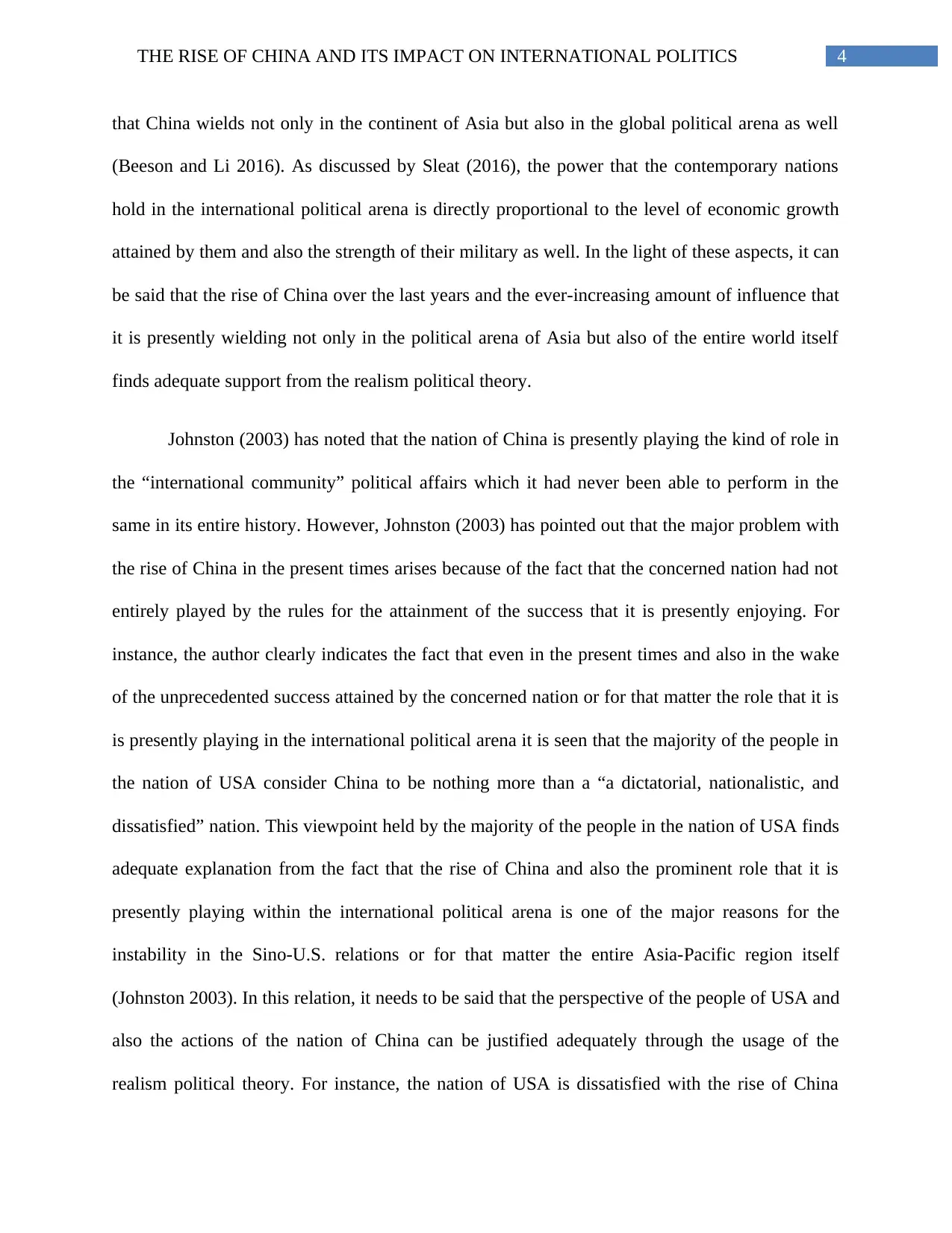
4THE RISE OF CHINA AND ITS IMPACT ON INTERNATIONAL POLITICS
that China wields not only in the continent of Asia but also in the global political arena as well
(Beeson and Li 2016). As discussed by Sleat (2016), the power that the contemporary nations
hold in the international political arena is directly proportional to the level of economic growth
attained by them and also the strength of their military as well. In the light of these aspects, it can
be said that the rise of China over the last years and the ever-increasing amount of influence that
it is presently wielding not only in the political arena of Asia but also of the entire world itself
finds adequate support from the realism political theory.
Johnston (2003) has noted that the nation of China is presently playing the kind of role in
the “international community” political affairs which it had never been able to perform in the
same in its entire history. However, Johnston (2003) has pointed out that the major problem with
the rise of China in the present times arises because of the fact that the concerned nation had not
entirely played by the rules for the attainment of the success that it is presently enjoying. For
instance, the author clearly indicates the fact that even in the present times and also in the wake
of the unprecedented success attained by the concerned nation or for that matter the role that it is
is presently playing in the international political arena it is seen that the majority of the people in
the nation of USA consider China to be nothing more than a “a dictatorial, nationalistic, and
dissatisfied” nation. This viewpoint held by the majority of the people in the nation of USA finds
adequate explanation from the fact that the rise of China and also the prominent role that it is
presently playing within the international political arena is one of the major reasons for the
instability in the Sino-U.S. relations or for that matter the entire Asia-Pacific region itself
(Johnston 2003). In this relation, it needs to be said that the perspective of the people of USA and
also the actions of the nation of China can be justified adequately through the usage of the
realism political theory. For instance, the nation of USA is dissatisfied with the rise of China
that China wields not only in the continent of Asia but also in the global political arena as well
(Beeson and Li 2016). As discussed by Sleat (2016), the power that the contemporary nations
hold in the international political arena is directly proportional to the level of economic growth
attained by them and also the strength of their military as well. In the light of these aspects, it can
be said that the rise of China over the last years and the ever-increasing amount of influence that
it is presently wielding not only in the political arena of Asia but also of the entire world itself
finds adequate support from the realism political theory.
Johnston (2003) has noted that the nation of China is presently playing the kind of role in
the “international community” political affairs which it had never been able to perform in the
same in its entire history. However, Johnston (2003) has pointed out that the major problem with
the rise of China in the present times arises because of the fact that the concerned nation had not
entirely played by the rules for the attainment of the success that it is presently enjoying. For
instance, the author clearly indicates the fact that even in the present times and also in the wake
of the unprecedented success attained by the concerned nation or for that matter the role that it is
is presently playing in the international political arena it is seen that the majority of the people in
the nation of USA consider China to be nothing more than a “a dictatorial, nationalistic, and
dissatisfied” nation. This viewpoint held by the majority of the people in the nation of USA finds
adequate explanation from the fact that the rise of China and also the prominent role that it is
presently playing within the international political arena is one of the major reasons for the
instability in the Sino-U.S. relations or for that matter the entire Asia-Pacific region itself
(Johnston 2003). In this relation, it needs to be said that the perspective of the people of USA and
also the actions of the nation of China can be justified adequately through the usage of the
realism political theory. For instance, the nation of USA is dissatisfied with the rise of China
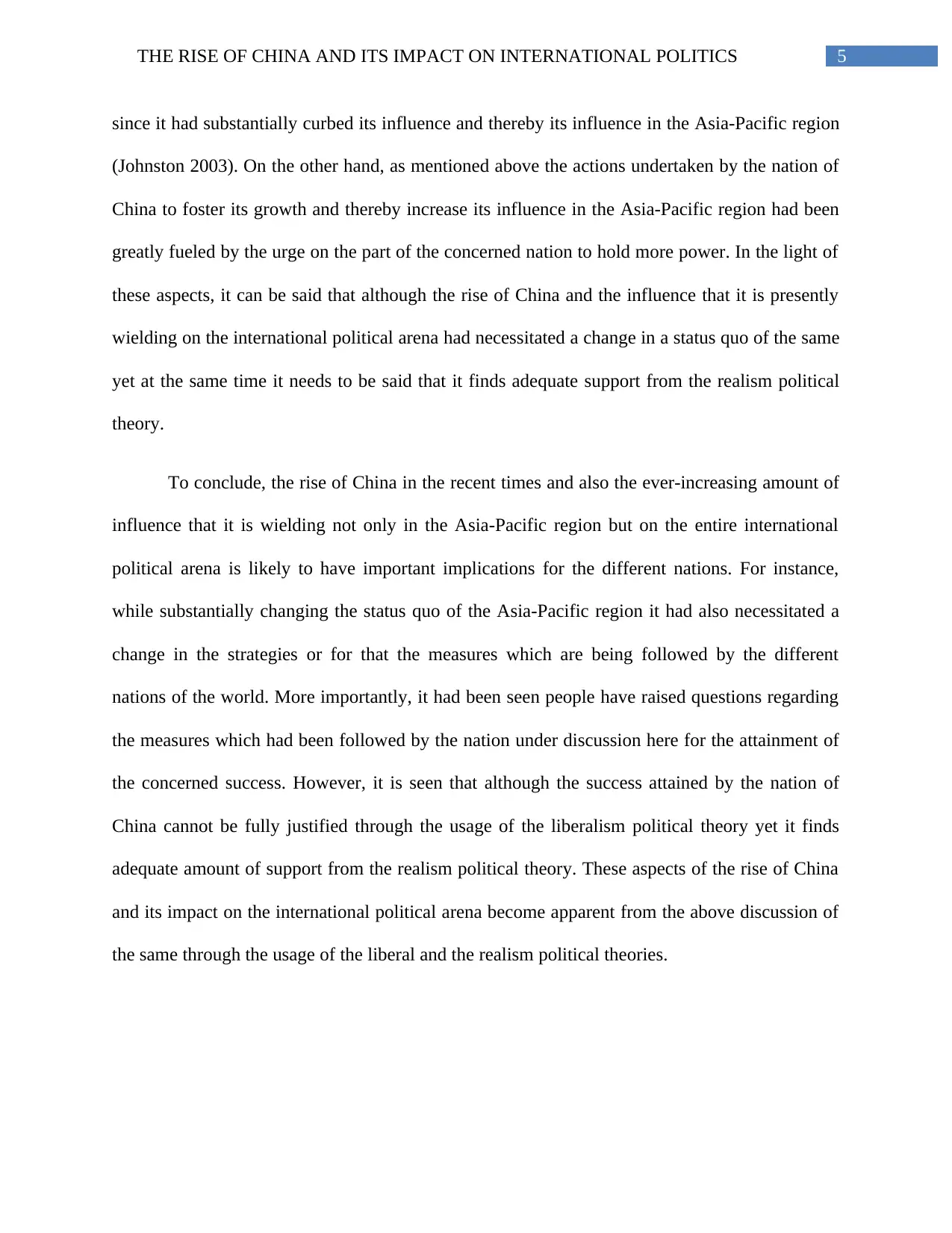
5THE RISE OF CHINA AND ITS IMPACT ON INTERNATIONAL POLITICS
since it had substantially curbed its influence and thereby its influence in the Asia-Pacific region
(Johnston 2003). On the other hand, as mentioned above the actions undertaken by the nation of
China to foster its growth and thereby increase its influence in the Asia-Pacific region had been
greatly fueled by the urge on the part of the concerned nation to hold more power. In the light of
these aspects, it can be said that although the rise of China and the influence that it is presently
wielding on the international political arena had necessitated a change in a status quo of the same
yet at the same time it needs to be said that it finds adequate support from the realism political
theory.
To conclude, the rise of China in the recent times and also the ever-increasing amount of
influence that it is wielding not only in the Asia-Pacific region but on the entire international
political arena is likely to have important implications for the different nations. For instance,
while substantially changing the status quo of the Asia-Pacific region it had also necessitated a
change in the strategies or for that the measures which are being followed by the different
nations of the world. More importantly, it had been seen people have raised questions regarding
the measures which had been followed by the nation under discussion here for the attainment of
the concerned success. However, it is seen that although the success attained by the nation of
China cannot be fully justified through the usage of the liberalism political theory yet it finds
adequate amount of support from the realism political theory. These aspects of the rise of China
and its impact on the international political arena become apparent from the above discussion of
the same through the usage of the liberal and the realism political theories.
since it had substantially curbed its influence and thereby its influence in the Asia-Pacific region
(Johnston 2003). On the other hand, as mentioned above the actions undertaken by the nation of
China to foster its growth and thereby increase its influence in the Asia-Pacific region had been
greatly fueled by the urge on the part of the concerned nation to hold more power. In the light of
these aspects, it can be said that although the rise of China and the influence that it is presently
wielding on the international political arena had necessitated a change in a status quo of the same
yet at the same time it needs to be said that it finds adequate support from the realism political
theory.
To conclude, the rise of China in the recent times and also the ever-increasing amount of
influence that it is wielding not only in the Asia-Pacific region but on the entire international
political arena is likely to have important implications for the different nations. For instance,
while substantially changing the status quo of the Asia-Pacific region it had also necessitated a
change in the strategies or for that the measures which are being followed by the different
nations of the world. More importantly, it had been seen people have raised questions regarding
the measures which had been followed by the nation under discussion here for the attainment of
the concerned success. However, it is seen that although the success attained by the nation of
China cannot be fully justified through the usage of the liberalism political theory yet it finds
adequate amount of support from the realism political theory. These aspects of the rise of China
and its impact on the international political arena become apparent from the above discussion of
the same through the usage of the liberal and the realism political theories.
⊘ This is a preview!⊘
Do you want full access?
Subscribe today to unlock all pages.

Trusted by 1+ million students worldwide
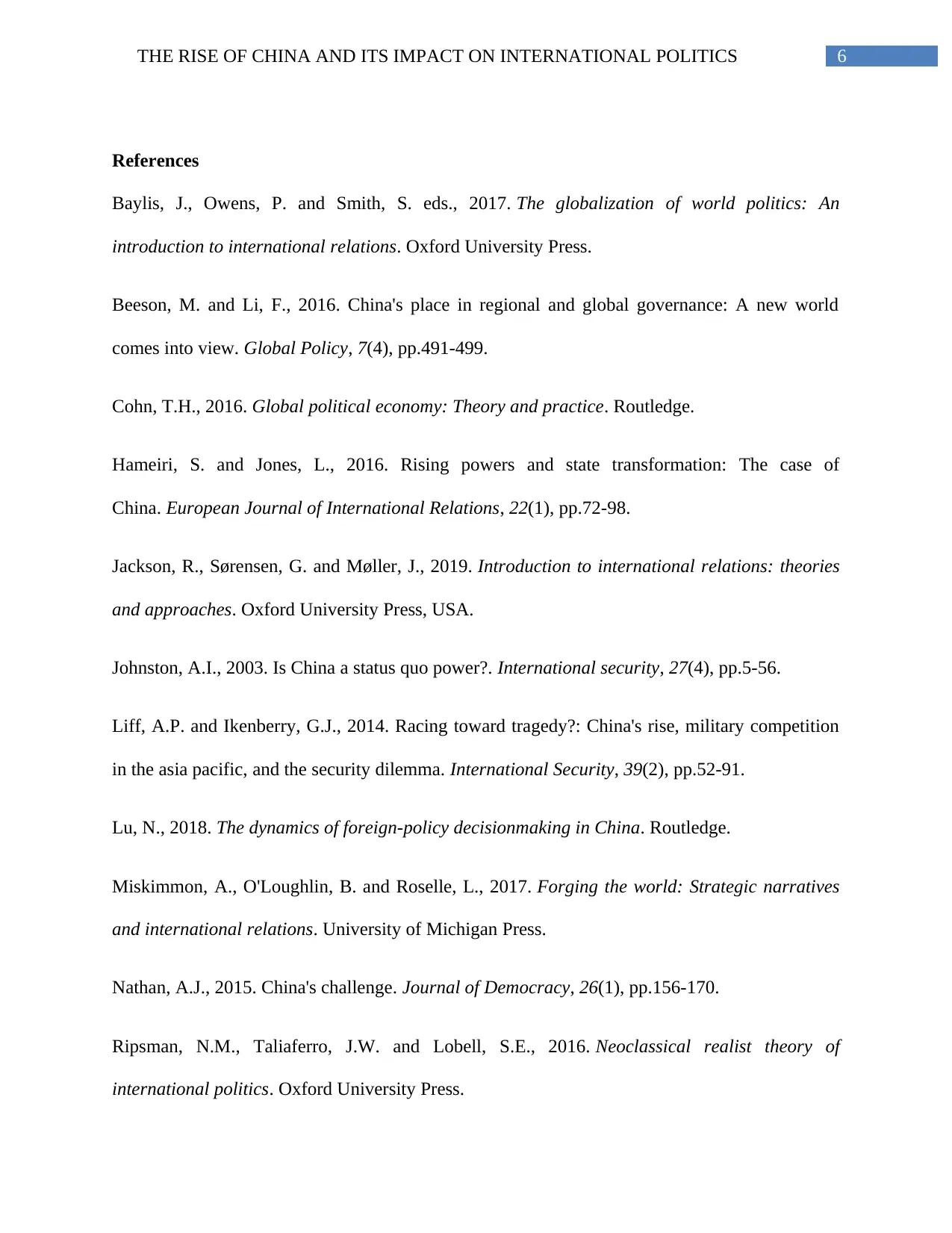
6THE RISE OF CHINA AND ITS IMPACT ON INTERNATIONAL POLITICS
References
Baylis, J., Owens, P. and Smith, S. eds., 2017. The globalization of world politics: An
introduction to international relations. Oxford University Press.
Beeson, M. and Li, F., 2016. China's place in regional and global governance: A new world
comes into view. Global Policy, 7(4), pp.491-499.
Cohn, T.H., 2016. Global political economy: Theory and practice. Routledge.
Hameiri, S. and Jones, L., 2016. Rising powers and state transformation: The case of
China. European Journal of International Relations, 22(1), pp.72-98.
Jackson, R., Sørensen, G. and Møller, J., 2019. Introduction to international relations: theories
and approaches. Oxford University Press, USA.
Johnston, A.I., 2003. Is China a status quo power?. International security, 27(4), pp.5-56.
Liff, A.P. and Ikenberry, G.J., 2014. Racing toward tragedy?: China's rise, military competition
in the asia pacific, and the security dilemma. International Security, 39(2), pp.52-91.
Lu, N., 2018. The dynamics of foreign-policy decisionmaking in China. Routledge.
Miskimmon, A., O'Loughlin, B. and Roselle, L., 2017. Forging the world: Strategic narratives
and international relations. University of Michigan Press.
Nathan, A.J., 2015. China's challenge. Journal of Democracy, 26(1), pp.156-170.
Ripsman, N.M., Taliaferro, J.W. and Lobell, S.E., 2016. Neoclassical realist theory of
international politics. Oxford University Press.
References
Baylis, J., Owens, P. and Smith, S. eds., 2017. The globalization of world politics: An
introduction to international relations. Oxford University Press.
Beeson, M. and Li, F., 2016. China's place in regional and global governance: A new world
comes into view. Global Policy, 7(4), pp.491-499.
Cohn, T.H., 2016. Global political economy: Theory and practice. Routledge.
Hameiri, S. and Jones, L., 2016. Rising powers and state transformation: The case of
China. European Journal of International Relations, 22(1), pp.72-98.
Jackson, R., Sørensen, G. and Møller, J., 2019. Introduction to international relations: theories
and approaches. Oxford University Press, USA.
Johnston, A.I., 2003. Is China a status quo power?. International security, 27(4), pp.5-56.
Liff, A.P. and Ikenberry, G.J., 2014. Racing toward tragedy?: China's rise, military competition
in the asia pacific, and the security dilemma. International Security, 39(2), pp.52-91.
Lu, N., 2018. The dynamics of foreign-policy decisionmaking in China. Routledge.
Miskimmon, A., O'Loughlin, B. and Roselle, L., 2017. Forging the world: Strategic narratives
and international relations. University of Michigan Press.
Nathan, A.J., 2015. China's challenge. Journal of Democracy, 26(1), pp.156-170.
Ripsman, N.M., Taliaferro, J.W. and Lobell, S.E., 2016. Neoclassical realist theory of
international politics. Oxford University Press.
Paraphrase This Document
Need a fresh take? Get an instant paraphrase of this document with our AI Paraphraser
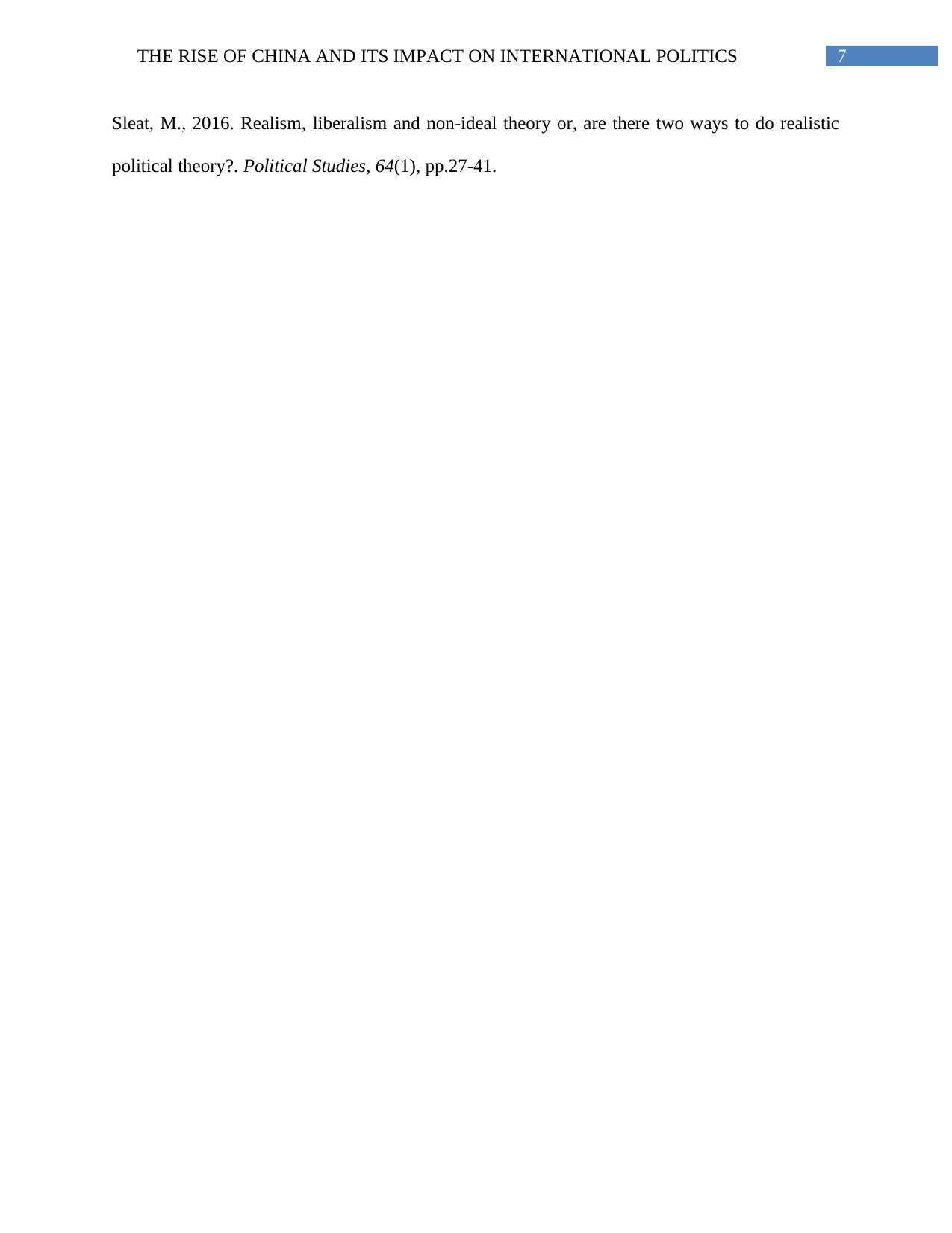
7THE RISE OF CHINA AND ITS IMPACT ON INTERNATIONAL POLITICS
Sleat, M., 2016. Realism, liberalism and non-ideal theory or, are there two ways to do realistic
political theory?. Political Studies, 64(1), pp.27-41.
Sleat, M., 2016. Realism, liberalism and non-ideal theory or, are there two ways to do realistic
political theory?. Political Studies, 64(1), pp.27-41.
1 out of 8
Related Documents
Your All-in-One AI-Powered Toolkit for Academic Success.
+13062052269
info@desklib.com
Available 24*7 on WhatsApp / Email
![[object Object]](/_next/static/media/star-bottom.7253800d.svg)
Unlock your academic potential
Copyright © 2020–2026 A2Z Services. All Rights Reserved. Developed and managed by ZUCOL.





